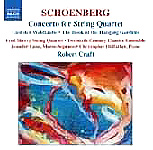Here is a fine mixed assortment of music by Arnold Schoenberg. All of the performances are high quality, and two of them are now my reference recordings. Even if this were a full-price disc, the expert performances, clean engineering, and wide sonic range (including particularly solid bass) would make it a top choice.
The performance of Das Buch der Hängenden Gärten is notable for lovely, accurate singing by Jennifer Lane and sensitive, fluent support by pianist Christopher Oldfather. Lane produces a more beautiful tone, with more consistency between registers, than the major rival performance by Jan DeGaetani and pianist Gilbert Kalish on Nonesuch. But DeGaetani exploits register differences to create a wider range of effect and knows when some vocal harshness is called for. Lane may excel in presenting the love music’s lyricism, but DeGaetani makes the loss and anguish more keenly felt. Although my reference here remains DeGaetani/Kalish, Lane’s rendition is still excellent, and I dare say that some listeners will prefer hers because of its sheer vocal beauty.
The Piano Suite Op. 25 occupies a pivotal spot in music history as Schoenberg’s first completely 12-tone work. Again the top contender is a classic Nonesuch CD, this time played by Paul Jacobs, who projects more angst. Oldfather presents a clarified, even witty approach that makes this music sound less “difficult” than usual while demonstrating that Schoenberg used neo-classical form and texture to support his radical melodic/harmonic technique. Since the Nonesuch disc’s sound is a little fuzzy by today’s standards, it’s an easy nod for the new disc.
Lied der Waldtaube is a song from Schoenberg’s Gurre-Lieder. Schoenberg stripped the original lush full-orchestral accompaniment down to a 15-piece ensemble to create the arrangement recorded here. Jennifer Lane returns as soloist, again displaying her creamy mezzo-soprano in particularly sensitive singing. This is definitely worth hearing–and acquiring as an alternative. In the end though, fans of this music will want the late-Romantic original orchestration for its stronger emotional punch.
Schoenberg, who was not a particular fan of Handel, felt free to mess around with the Baroque master’s Concerto Grosso Op. 6 No. 7. Often altering Handel’s harmonization, and with downright loopy “wrong” notes scattered around the score, this strange piece is Schoenberg’s funniest composition. Robert Craft, a friend of Schoenberg’s in his later days and a pioneer in conducting the composer’s music in America, leads the Fred Sherry String Quartet (formed for the occasion of this recording) and the Twentieth Century Classics Ensemble in a recording of this piece that’s unprecedented in clarity and wit, with full-bodied sound to match. The disc concludes with a rather charming 1949 interview of Schoenberg by American composer Halsey Stevens.
































